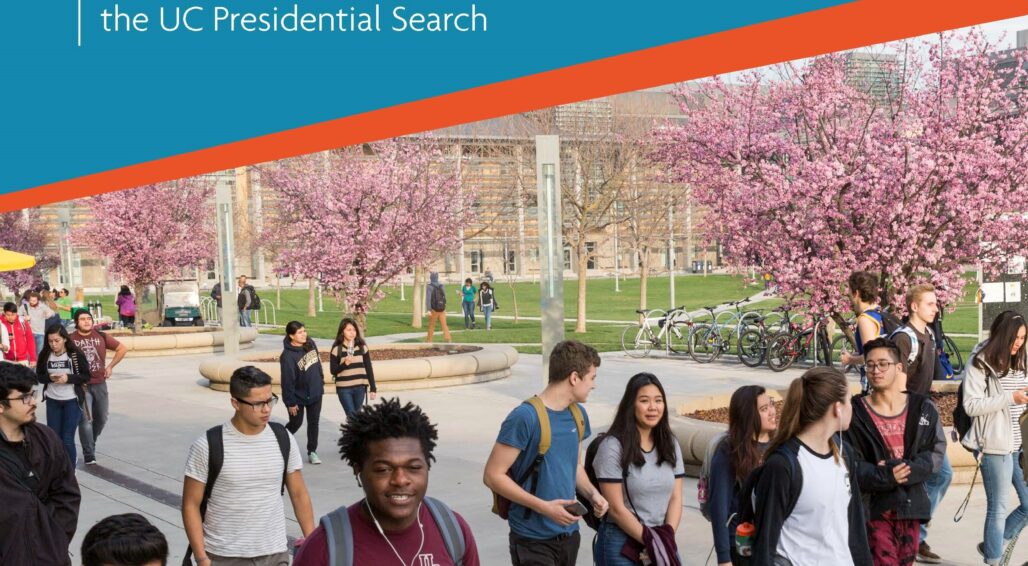Publications & Research
New College Futures Report: Perspectives on the Search for the Next UC President

The leadership transition at the University of California is occurring at a unique moment, when the nature of learning, work, and the economy in our state are undergoing significant transformation. As head of one of the world’s premier postsecondary research institutions, the new UC president will help shape the future of higher education in California and beyond.
The process of selecting a new leader has traditionally focused on gathering input from stakeholders within the University of California, including students, faculty, staff, and alumni. To bring external partners to the table in this search, College Futures Foundation organized two forums. The events, held at UC Davis in December of 2019 and UCLA in January of 2020, provided the UC Regents’ presidential search committee with testimony from organizations working in the field of postsecondary education, workforce and economic development, and student success.
The speakers’ perspectives varied, but they had a common goal: to ensure that the UC has strong leadership that can build on the state’s legacy of accessible postsecondary education and continue the momentum to expand opportunity and student success. The themes that surfaced from the speakers’ remarks are detailed in a new report from College Futures Foundation, A New Era of Leadership for the University of California: Perspectives on Priorities for the UC Presidential Search. Collectively, the input from these external stakeholders provide a landscape of the current moment, concrete proposals for the future, and criteria for the selection of the next UC president.
While the UC wields tremendous influence across sectors and throughout the state, speakers wanted the next president to emphasize two main roles for the university system:
- A Driver of Socioeconomic Mobility. Even as the UC has helped transform California into the fifth-largest economy, nearly half of the state’s working families are living in poverty. The UC can continue to boost the state’s economy, but in ways that makes life better for all Californians.
- A Collaborator for a Seamless Education System. As a receiver of high school graduates and transfer students, the UC should focus on intersegmental partnerships that encourage and ease students’ transitions. The UC can work more closely with K-12 districts, the California Community Colleges, and the California State University to familiarize students with the UC, align coursework to better prepare students, increase support services, and remove barriers.
Increasing student access and success was cited as the top priority, and speakers said that for maximum impact, the UC should focus on those who have been historically underserved but are now a large and growing part of the state population:
- Students of Color. While the UC should build on promising initiatives to attract more students of color, recruitment is not enough. The UC needs to leverage data to call out and change policies and practices that have disadvantaged students of color, such as the lack of diversity among faculty.
- Students from Low-income Families. In a state with the highest poverty rate in the country, students are more likely to be struggling to pay for housing, food, and other basic needs – non-tuition costs that are not covered by most financial aid. The UC should partner with state leaders to find new approaches to funding financial aid that covers the true cost of attending college.
- Students from Underrepresented Regions. Higher education attainment in the Central Valley and Inland Empire have long been low and could get even worse as the areas suffer disproportionate shortfalls in university capacity. The UC should consider expanding access for students from underrepresented areas, both in their regions and at other campuses around the state.
What sets the UC apart from other prestigious universities is its status as a public institution, built by and dedicated to serving the state of California. Speakers said that for the UC to soar to even greater heights, the system must emphasize that identity in its culture in two ways:
- Transparent Sharing. The UC must actively engage with students, families, labor, and community groups, as well as high-level state, education, and business leaders and be transparent about its data and information.
- A Welcoming Climate. As the UC seeks to increase the number of students from underrepresented groups, campus environments and student supports must be inclusive and responsive to enable students to fulfill their potential.
The selection of a new UC leader comes at a time of great change and opportunity for higher education in our state.
College Futures Foundation is thankful to the speakers for their dedication to advancing higher education, workforce and economic development, and student success. We are also thankful to the University of California Regents’ presidential search committee for inviting input into this important process and allowing us to support the forums.
⇒ Read the Report
About the Presidential Search
More information about the presidential search can be found at presidentialsearch.universityofcalifornia.edu/index.html. Comments or questions can be emailed to UCPresidentSearch@ucop.edu.
View UC Presidential Search Forum Testimony
Testimony from the speakers referenced in this report was provided at two forums, following an open period of public commentary. Click the links below to watch recordings of the events.
